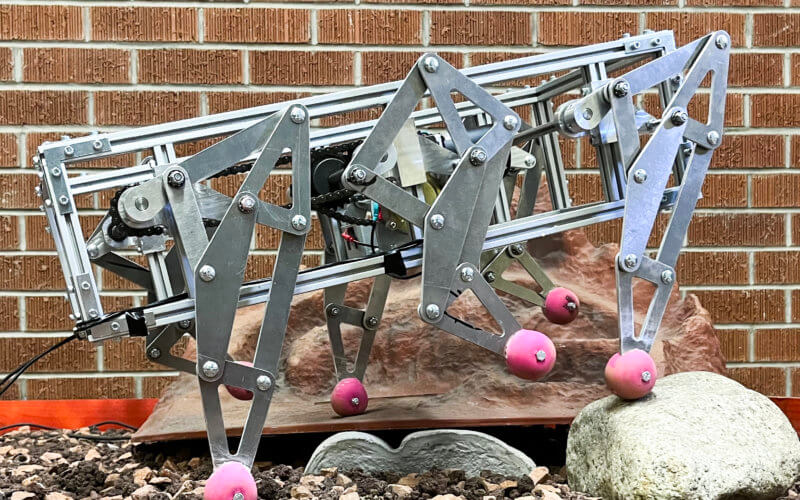
After she graduates this month, Subha Lal plans to use the engineering skills she learned at Cal State Fullerton to contribute to preserving the environment and advancing technology to better mankind.
As the team lead for TitanSat, a wildfire detection system using satellite technology, she’s on her way to making a difference.
“This project was a labor of love for my team. We are all passionate about preserving California and ensuring it remains a livable environment not completely overtaken by wildfires,” said Lal, president of CSUF’s chapter of Tau Beta Pi California Chi, an engineering honor society.
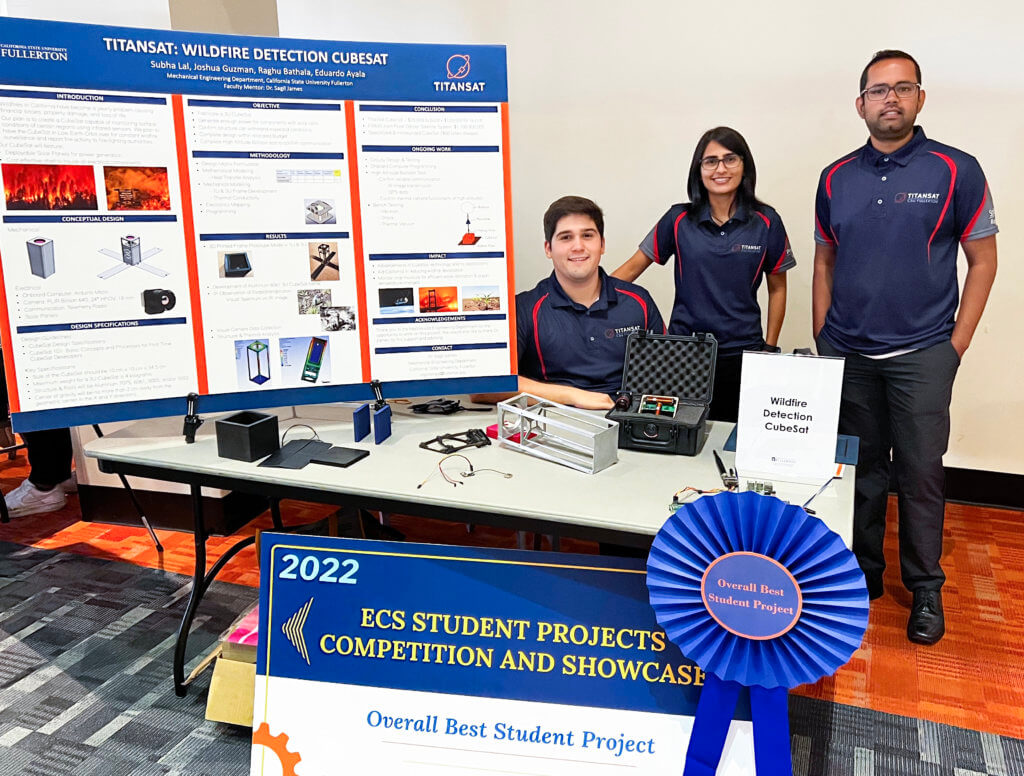
The mechanical engineering team won the Overall Best Student Project award at the May 2 College of Engineering and Computer Science Student Projects Competition and Showcase. Other TitanSat team members are Eduardo Ayala, Raghu Bathala and Joshua Guzman, all graduating seniors.
The showcase, held in person for the first time since the pandemic, featured 60 projects from across the college’s disciplines, with 48 projects entered in the competition. Of those, the top 20 projects were selected for the competition. A panel of four industry judges selected 10 projects for recognition and monetary awards. Many of the student projects also are sponsored by the college’s industry partners, such as Disneyland Resorts, Edwards Lifesciences, Raytheon, RJE International and Mercury Systems.
Dean Susan Barua applauded students for adapting to working on their projects during the pandemic.
“Your work and dedication show,” Barua told students. “I hope you capitalize on your project-based experiences as you take the next step in your academic or professional careers.”
TitanSat is a fourth-year legacy project, under the direction of Sagil James, associate professor of mechanical engineering. The project uses CubeSat technology, with the overarching goal of early detecting and preventing wildfire hazards in California.
“The focus of this project is to design, manufacture and build a cube-shaped, miniature satellite, or CubeSat, to observe the Earth’s surface to help detect fires,” said Lal, who will be a first-generation college graduate. Her parents immigrated to the U.S. from India, did not speak English and settled in Anaheim, where she grew up.
“The data captured will be used to assist fire authorities in detecting and controlling wildfires before they get out of control,” she said. “Our research aims to aid in preventing severe damage from natural disasters and protecting the environment.”
Lal faced obstacles getting to college, including understanding the admissions process and paying for college. She credits support from her family and professors, and her “hard work and determination,” for completing her CSUF education.
“My success is entirely owed to my parents,” added Lal, whose father worked multiple jobs to support his family. “My family went from farmers in a rural part of India to me learning how to build a satellite and earning a college degree.”
‘Crime Spotter’ Thwarts Theft of Catalytic Converters
For their senior project, a team of electrical engineering students developed a novel prototype to thwart the theft of catalytic converters – a rising crime among car crooks.
“Crime Spotter” is a security system that uses signals from sensors that detect sound, movement and vibration, without the use of the internet, said graduating senior Brian Fonseca, president of CSUF’s chapter of the Institute of Electrical and Electronics Engineers (IEEE).
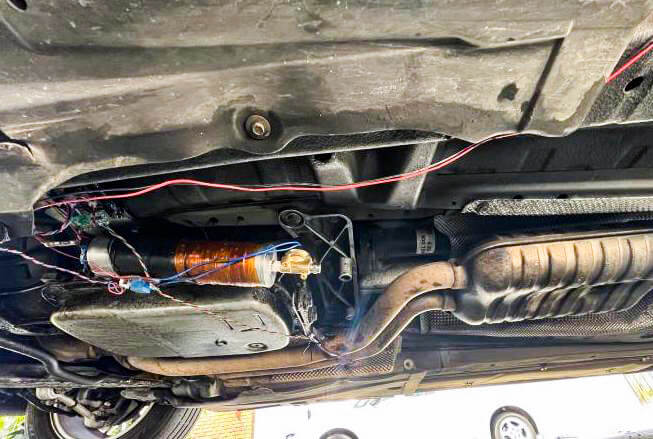
Catalytic converters contain precious metals and help to reduce a car’s pollutants and toxic gas from the emissions system. The prototype system is installed under the car’s gear shifter and is set in motion when the vehicle is parked.
“If a thief sets off the sensor when trying to steal the catalytic converter, a spray of liquid dye not only marks the thief, but the device, which makes it easily identifiable as stolen,” Fonseca explained.
The team, which also includes graduating seniors Edison Chingay and John Daniyarov, won Best Student Project in Electrical Engineering. The students are mentored by David Cheng, professor of electrical engineering.
“Learning how to make a product with constraints like money, time and scope helped us see engineering from an employer’s point of view,” Fonseca added. “Our future employers will appreciate our consideration of the details in designing, testing and implementing a prototype.”
Designing a Robot With a LegUp
A team of future mechanical engineers developed a robotic system that moves differently than a traditional wheeled rover: They designed a prototype with six legs that simultaneously rotate.
“The focus was to design a robot capable of multiple walking gaits to access rough terrain and have a simplified and reliable control system with low electrical power requirements,” said graduating senior Kyle Skulski.
The robot, dubbed LegUp, was inspired by Theo Jansen’s “Strandbeest” mechanism, in which the Dutch artist’s animated works were intended to be “a bridge between art and engineering,” explained Dylan Kunzmann, who also is graduating this month.
“We took Jansen’s idea, focused on engineering and applied it to the final frontier of space exploration. Our motivation was the excitement of NASA’s plans to go to the moon again, and soon,” Kunzmann added.
The team spent the last two semesters manufacturing, assembling and testing their robot under the mentorship of Nina Robson, associate professor of mechanical engineering. For their outstanding work, the team won Best Student Project in Mechanical Engineering. Other graduating team members are Matt Kim, Joshua Perez and Damian Marquez; also, students Brandon Arredondo and Brandon Rosales.
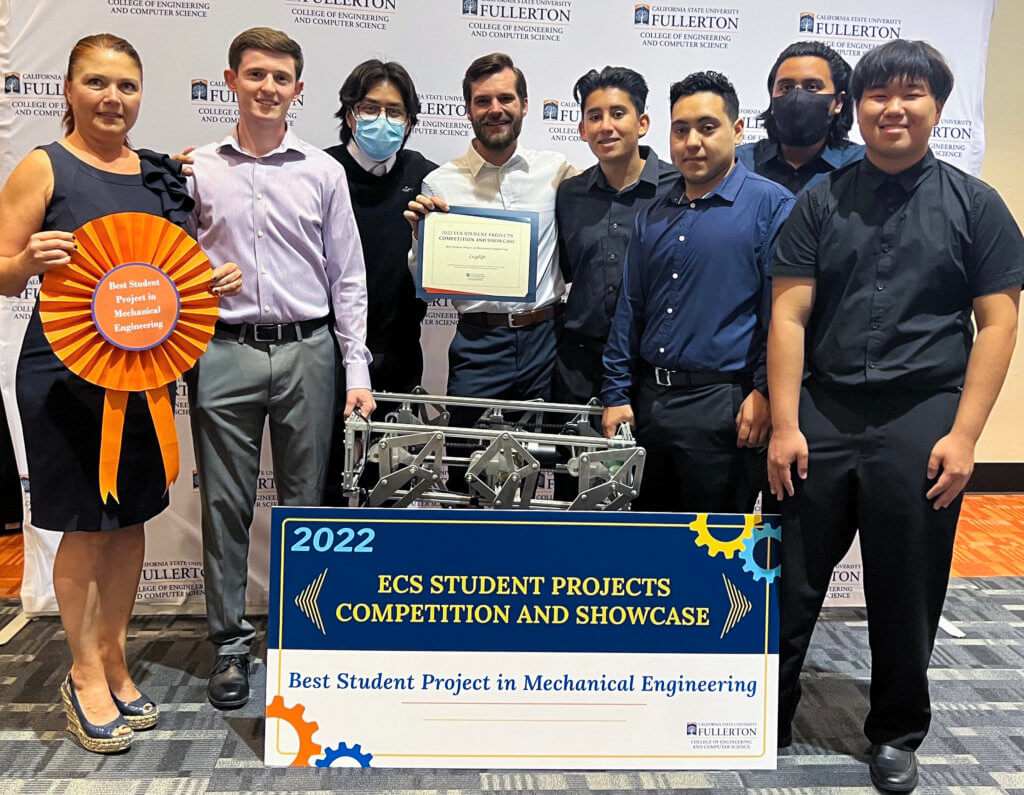
“We were given this award not only as a result of our hard work, but because of our application of many different mechanical engineering fields,” Kunzmann added.
The team also collaborated with Boeing on the project, one the college’s industry partners. While not selected as a finalist, the team submitted a collaborative project proposal to NASA’s 2022 BIG Idea Challenge: Extreme Terrain Access for Mobility Platforms – the first time a CSUF team entered the competition.
Building Better Bridges
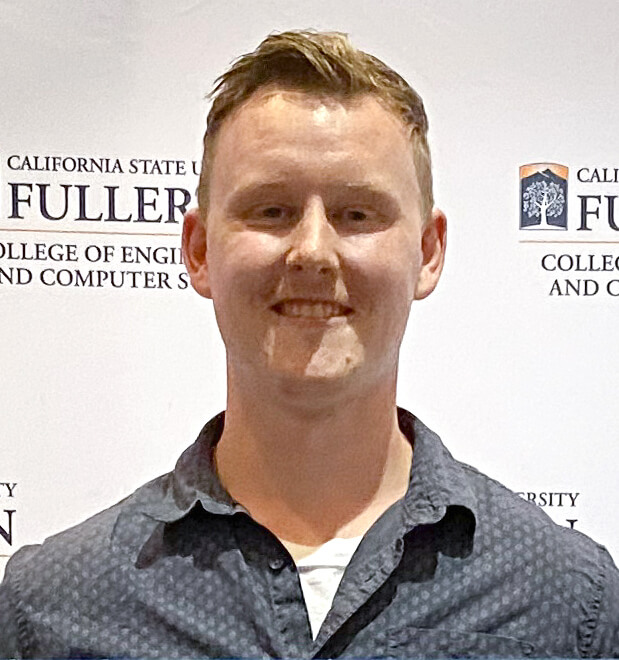
Future civil engineers Curtis Zimmerman, Carlos De La Sancha and Abril Herrera won the Best Student Project in Civil Engineering for their research project that uses zeolite-based materials to improve the integrity of concrete bridges.
The research project focuses on finding an optimal concrete composition to counter the corrosion of rebar, which is used in building bridges, explained Zimmerman, who plans to graduate next year.
Natural zeolite, a type of mineral mainly from volcanic ash, is abundant, inexpensive and environmentally friendly – and is found to strengthen the stability of concrete, said the team’s research mentor Pratanu Ghosh, professor of civil and environmental engineering.
“This research is important because it would allow longer service lives of concrete bridges, roads and structures that are exposed to corrosive environments. If implemented within the industry, the economic benefits would be insurmountable,” Zimmerman said.
All three students received 2021-22 Dwight David Eisenhower Transportation Fellowships from the U.S. Department of Transportation-Federal Highway Administration for their research efforts: Zimmerman, $10,000; De La Sancha, $7,000, and Herrera, $8,500.
Cal State Fullerton’s commencement celebrations will take place May 23-26.